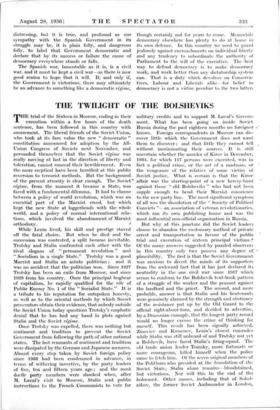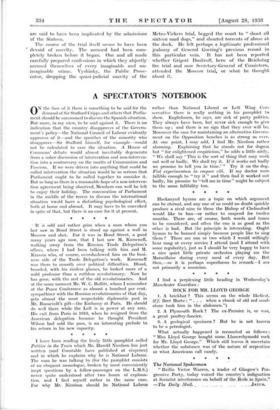THE TWILIGHT OF THE BOLSHEVIKS
THE trial of the Sixteen in Moscow, ending in their execution within a few hours of the death sentence, has been followed in this country with amazement. The liberal friends of the Soviet Union, who took at its face value the new " democratic " constitution announced for adoption by the All- Union Congress of Soviets next November, and persuaded themselves that the Soviet regime was really moving at last in the direction of liberty and toleratiOn, cannot conceal their bewilderment. Even the more sceptical have been horrified at this public reversion to terrorist methods. But the background of the present atrocity is clear enough. The Soviet' regime, from the moment it became a State, was faced with a fundamental dilemma. It had to choose between a policy of world revolution, which was an essential part of the Marxist creed, but which kept the new State at loggerheads with the whole world, and a policy of normal international rela- tions, which involved the abandonment of Marxist orthodoxy.
While Lenin lived, his skill and prestige staved off the fatal choice. But when he died and the succession was contested, a split became inevitable. Trotsky and Stalin confronted each other with the rival slogans of " permanent revolution " and " Socialism in a single State." Trotsky was a good Marxist and Stalin an astute politician ; and it was no accident that the politician won. Since 1927 Trotsky has been an exile from Moscow, and since 1929 from his country. Once the principal bugbear of capitalism, he rapidly qualified for the role of Public Enemy No. 1 of the " Socialist State." It is a tribute to his reputation for outspoken honesty, as well as to the oriental methods by which Soviet prosecutors obtain their evidence, that nobody outside the Soviet Union today questions Trotsky's emphatic denial that he has had any -hand in plots against Stalin and the Soviet regime.
Once Trotsky was expelled, there was nothing but sentiment and tradition to prevent the Soviet Government from following the path of other national states. The last remnants of sentiment and tradition were dissipated by the German and Japanese menaces. Almost every step taken by Soviet foreign policy since 1933 had been condemned in advance, in terms of -withering invective, by the party leaders of five, ten and fifteen years ago ; and the most docile -p. arty members were shocked when, after M. Laval's visit to Moscow, Stalin sent public instructions to the French Communists to vote for military credits and to support M. Laval's Govern- ment. What has been going on inside Soviet Russia during the past eighteen months no foreigner knows. Foreign correspondents in Moscow can dis- cover little which the Government does not want them to discover ; and that little they cannot tell without incriminating their sources. It is still uncertain whether the murder of Kirov in December, 1934, for which 117 persons were executed, was in fact a political crime, or the act of a madman, or the vengeance of the relative of some victim of Soviet justice. What is certain is that the Kirov affair was the starting-point of a new heresy-hunt against those " old Bolsheviks " who had not been supple enough to bend their Marxist conscience to the new party line. The most significant symptom of all was the dissolution of the " Society of Political Convicts "—an association of veteran revolutionaries, which ran its own publishing house and was the most influential non-official organisation in Russia.
But why at this juncture did the Soviet leaders choose to abandon the customary method of private arrest and transportation in favour of the public trial and execution of sixteen principal victims ? Of the many answers suggested by puzzled observers in this country only two possess any degree of plausibility. The first is that the Soviet Government was anxious to divert the minds of its supporters from the awkward fact that it has just declared its neutrality in the one civil war since 1917 which seems to conform to the Bolshevik text-book pattern of a struggle of the worker and the peasant against the landlord and the priest. The second, and more probable, answer is that Stalin and his lieutenants were genuinely alarmed by the strength and obstinacy of the resistance put up by the Old Guard to the official right-about-turn, and decided to advertise, by a Draconian example, that the longest party record would no longer excuse the crime of thinking for oneself. This result has been signally achieved. Zinoviev and Kamenev, Lenin's closest comrades while Stalin was still unheard of and Trotsky not yet a Bolshevik, have faced Stalin's firing-squad. The old trade union leader Tomsky, more fortunate or more courageous, killed himself when the police came to fetch him. Of the seven original members of the Politburo who presided at the foundation of the Soviet State, Stalin alone remains—bloodstained, but victorious. Nor will this be the end of the holocaust. Other names, including. that of Sokol- nikov, the former Soviet Ambassador in London, are said to have been implicated by the admissions of the Sixteen.
The course of the trial itself seems to have been " devoid of novelty. The accused had been com- pletely broken before it began. One and all made carefully prepared confessions in which they abjectly accused themselves of every imaginable and un- imaginable crime. Vyshinky, the Public Prose- cutor, dropping the quasi-judicial suavity of the Metro-Vickers trial, begged the court to " shoot all sixteen mad dogs," and shouted torrents of abuse at the dock. He felt perhaps a legitimate professional jealousy of General Goering's previous record in this particular vein. It has not been reported whether Grigori Dmitroff, hero of the Reichstag fire trial and now Secretary-General of Comintern, attended the Moscow trial, or what he thought about it.







































 Previous page
Previous page